Comparative Study of Ethics: Plato's Critique, Locke and Marx's Views
VerifiedAdded on 2020/05/16
|7
|1872
|88
Essay
AI Summary
This essay offers a comparative analysis of the ethical theories of Plato, John Locke, and Karl Marx. It begins by examining Plato's critique of democracy, contrasting his views with the more modern perspectives. The essay then delves into the distinct ethical frameworks of Locke, who emphasizes happiness and the means to achieve it, and Marx, who views ethics as a reflection of societal structures and class interests. The analysis highlights the differing viewpoints on human action, morality, and societal structures, providing a comprehensive understanding of these influential philosophers' contributions to ethical thought. The essay concludes by summarizing the contrasting ideas of these philosophers and their lasting impact on philosophical discourse, emphasizing how their ideas have shaped our understanding of ethics and society.
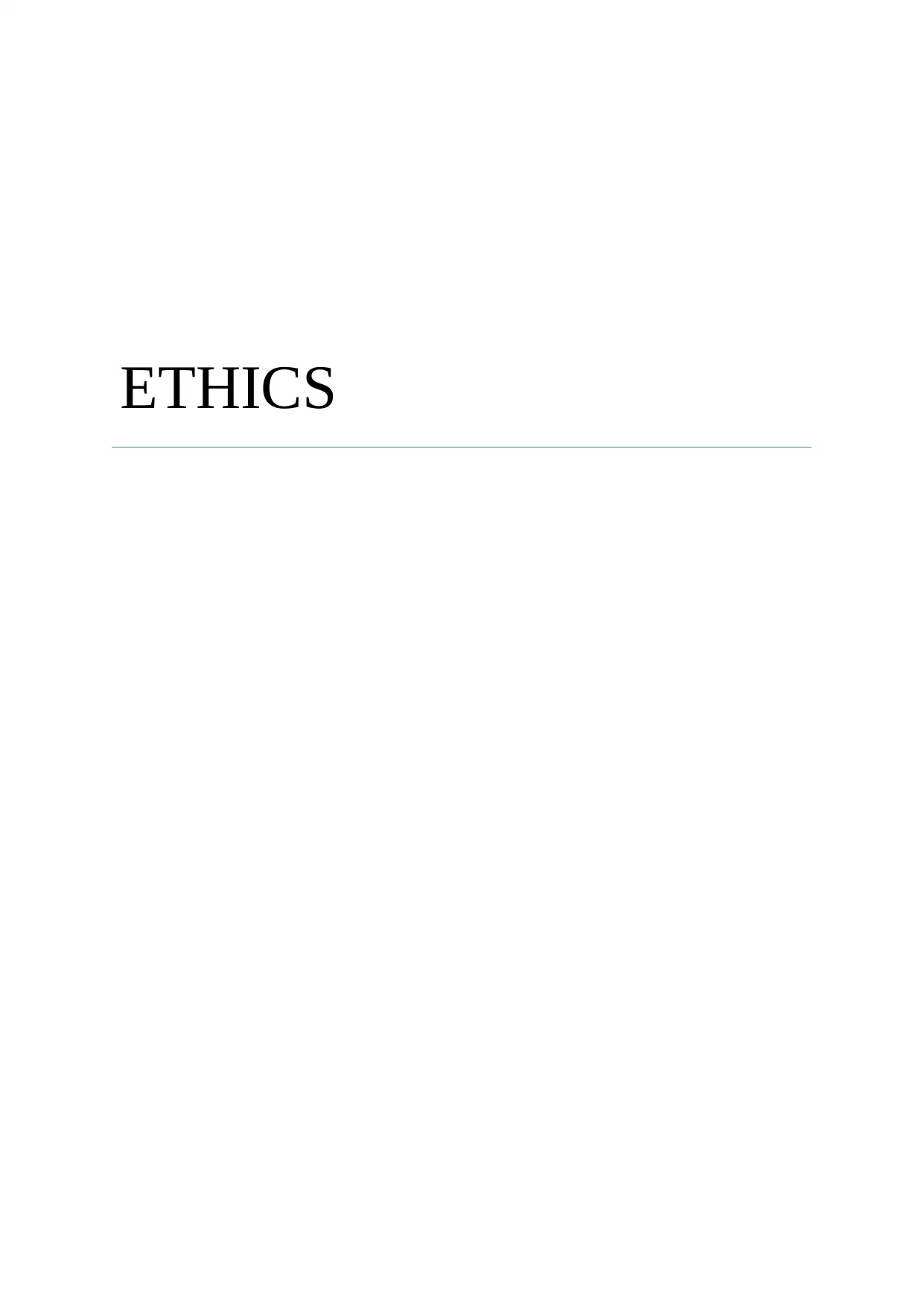
ETHICS
Paraphrase This Document
Need a fresh take? Get an instant paraphrase of this document with our AI Paraphraser
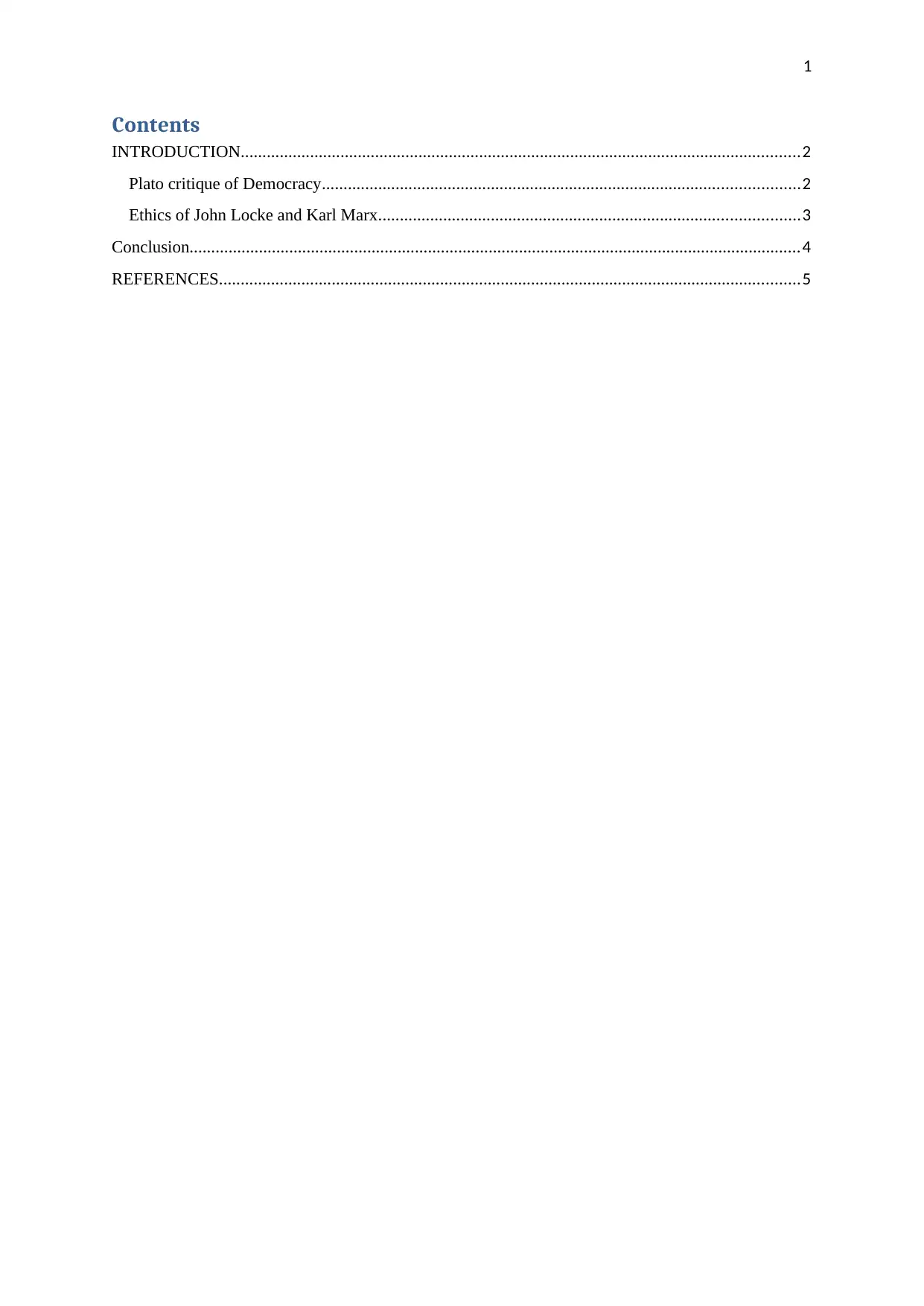
1
Contents
INTRODUCTION.................................................................................................................................2
Plato critique of Democracy..............................................................................................................2
Ethics of John Locke and Karl Marx.................................................................................................3
Conclusion.............................................................................................................................................4
REFERENCES......................................................................................................................................5
Contents
INTRODUCTION.................................................................................................................................2
Plato critique of Democracy..............................................................................................................2
Ethics of John Locke and Karl Marx.................................................................................................3
Conclusion.............................................................................................................................................4
REFERENCES......................................................................................................................................5
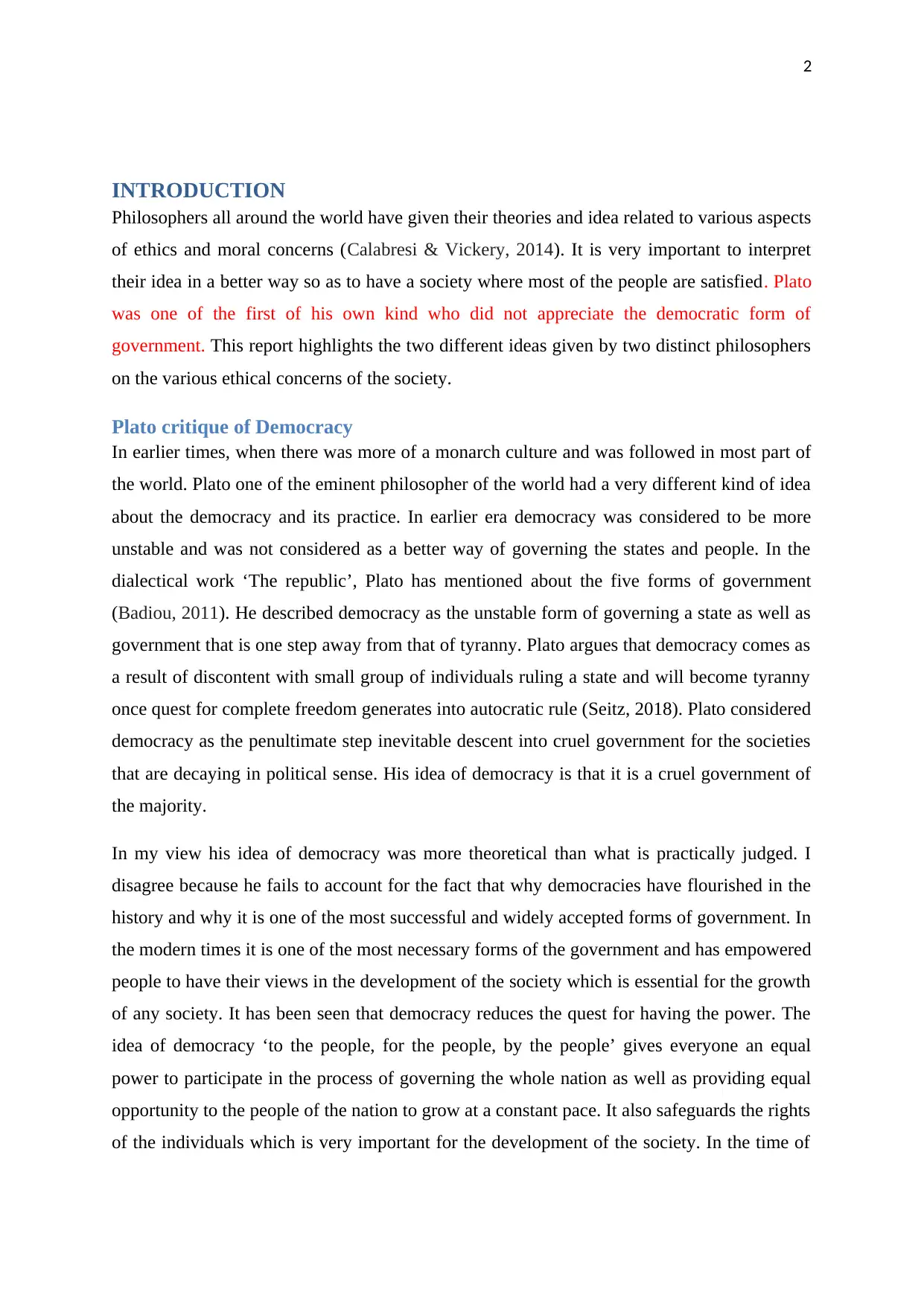
2
INTRODUCTION
Philosophers all around the world have given their theories and idea related to various aspects
of ethics and moral concerns (Calabresi & Vickery, 2014). It is very important to interpret
their idea in a better way so as to have a society where most of the people are satisfied. Plato
was one of the first of his own kind who did not appreciate the democratic form of
government. This report highlights the two different ideas given by two distinct philosophers
on the various ethical concerns of the society.
Plato critique of Democracy
In earlier times, when there was more of a monarch culture and was followed in most part of
the world. Plato one of the eminent philosopher of the world had a very different kind of idea
about the democracy and its practice. In earlier era democracy was considered to be more
unstable and was not considered as a better way of governing the states and people. In the
dialectical work ‘The republic’, Plato has mentioned about the five forms of government
(Badiou, 2011). He described democracy as the unstable form of governing a state as well as
government that is one step away from that of tyranny. Plato argues that democracy comes as
a result of discontent with small group of individuals ruling a state and will become tyranny
once quest for complete freedom generates into autocratic rule (Seitz, 2018). Plato considered
democracy as the penultimate step inevitable descent into cruel government for the societies
that are decaying in political sense. His idea of democracy is that it is a cruel government of
the majority.
In my view his idea of democracy was more theoretical than what is practically judged. I
disagree because he fails to account for the fact that why democracies have flourished in the
history and why it is one of the most successful and widely accepted forms of government. In
the modern times it is one of the most necessary forms of the government and has empowered
people to have their views in the development of the society which is essential for the growth
of any society. It has been seen that democracy reduces the quest for having the power. The
idea of democracy ‘to the people, for the people, by the people’ gives everyone an equal
power to participate in the process of governing the whole nation as well as providing equal
opportunity to the people of the nation to grow at a constant pace. It also safeguards the rights
of the individuals which is very important for the development of the society. In the time of
INTRODUCTION
Philosophers all around the world have given their theories and idea related to various aspects
of ethics and moral concerns (Calabresi & Vickery, 2014). It is very important to interpret
their idea in a better way so as to have a society where most of the people are satisfied. Plato
was one of the first of his own kind who did not appreciate the democratic form of
government. This report highlights the two different ideas given by two distinct philosophers
on the various ethical concerns of the society.
Plato critique of Democracy
In earlier times, when there was more of a monarch culture and was followed in most part of
the world. Plato one of the eminent philosopher of the world had a very different kind of idea
about the democracy and its practice. In earlier era democracy was considered to be more
unstable and was not considered as a better way of governing the states and people. In the
dialectical work ‘The republic’, Plato has mentioned about the five forms of government
(Badiou, 2011). He described democracy as the unstable form of governing a state as well as
government that is one step away from that of tyranny. Plato argues that democracy comes as
a result of discontent with small group of individuals ruling a state and will become tyranny
once quest for complete freedom generates into autocratic rule (Seitz, 2018). Plato considered
democracy as the penultimate step inevitable descent into cruel government for the societies
that are decaying in political sense. His idea of democracy is that it is a cruel government of
the majority.
In my view his idea of democracy was more theoretical than what is practically judged. I
disagree because he fails to account for the fact that why democracies have flourished in the
history and why it is one of the most successful and widely accepted forms of government. In
the modern times it is one of the most necessary forms of the government and has empowered
people to have their views in the development of the society which is essential for the growth
of any society. It has been seen that democracy reduces the quest for having the power. The
idea of democracy ‘to the people, for the people, by the people’ gives everyone an equal
power to participate in the process of governing the whole nation as well as providing equal
opportunity to the people of the nation to grow at a constant pace. It also safeguards the rights
of the individuals which is very important for the development of the society. In the time of
⊘ This is a preview!⊘
Do you want full access?
Subscribe today to unlock all pages.

Trusted by 1+ million students worldwide
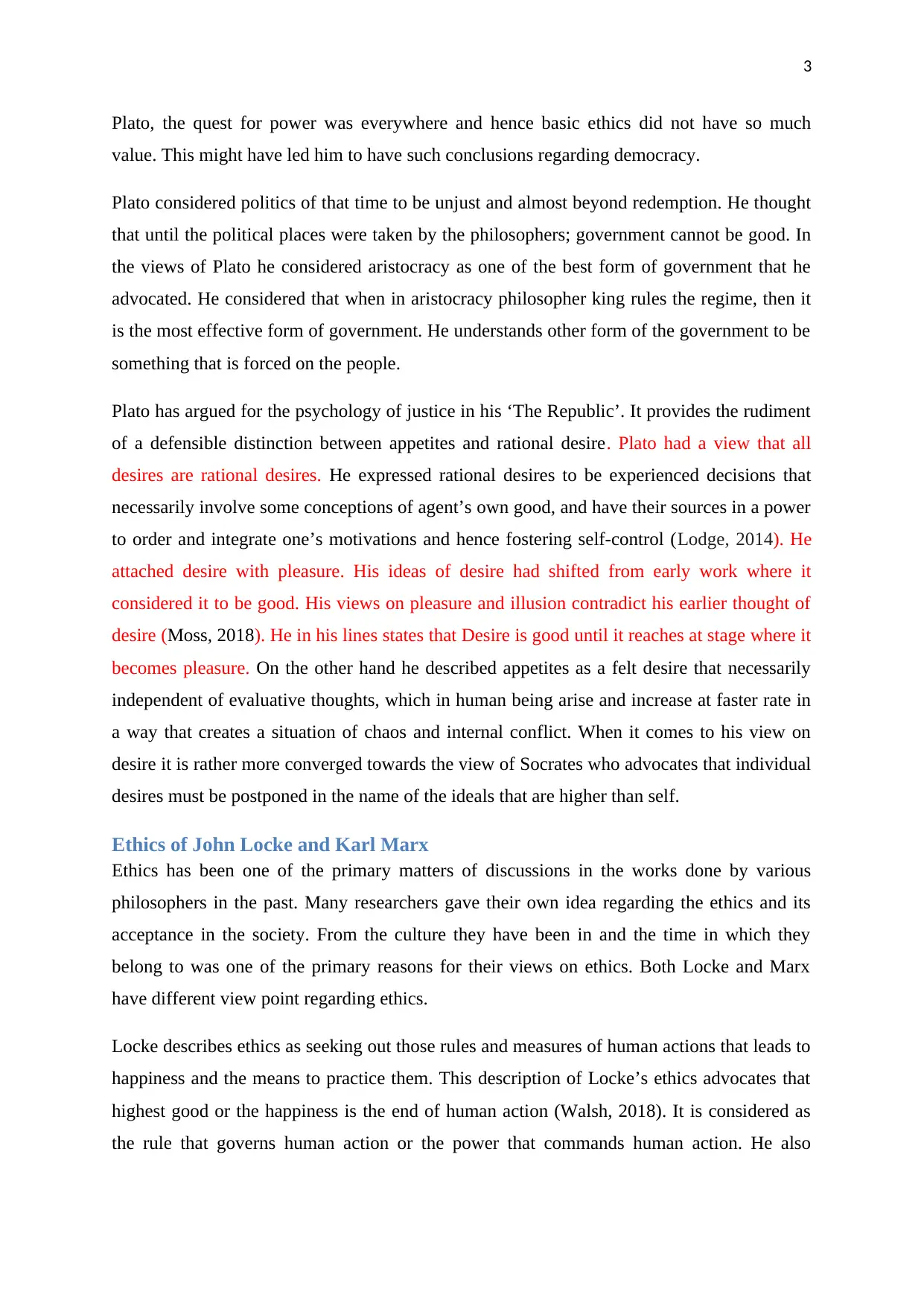
3
Plato, the quest for power was everywhere and hence basic ethics did not have so much
value. This might have led him to have such conclusions regarding democracy.
Plato considered politics of that time to be unjust and almost beyond redemption. He thought
that until the political places were taken by the philosophers; government cannot be good. In
the views of Plato he considered aristocracy as one of the best form of government that he
advocated. He considered that when in aristocracy philosopher king rules the regime, then it
is the most effective form of government. He understands other form of the government to be
something that is forced on the people.
Plato has argued for the psychology of justice in his ‘The Republic’. It provides the rudiment
of a defensible distinction between appetites and rational desire. Plato had a view that all
desires are rational desires. He expressed rational desires to be experienced decisions that
necessarily involve some conceptions of agent’s own good, and have their sources in a power
to order and integrate one’s motivations and hence fostering self-control (Lodge, 2014). He
attached desire with pleasure. His ideas of desire had shifted from early work where it
considered it to be good. His views on pleasure and illusion contradict his earlier thought of
desire (Moss, 2018). He in his lines states that Desire is good until it reaches at stage where it
becomes pleasure. On the other hand he described appetites as a felt desire that necessarily
independent of evaluative thoughts, which in human being arise and increase at faster rate in
a way that creates a situation of chaos and internal conflict. When it comes to his view on
desire it is rather more converged towards the view of Socrates who advocates that individual
desires must be postponed in the name of the ideals that are higher than self.
Ethics of John Locke and Karl Marx
Ethics has been one of the primary matters of discussions in the works done by various
philosophers in the past. Many researchers gave their own idea regarding the ethics and its
acceptance in the society. From the culture they have been in and the time in which they
belong to was one of the primary reasons for their views on ethics. Both Locke and Marx
have different view point regarding ethics.
Locke describes ethics as seeking out those rules and measures of human actions that leads to
happiness and the means to practice them. This description of Locke’s ethics advocates that
highest good or the happiness is the end of human action (Walsh, 2018). It is considered as
the rule that governs human action or the power that commands human action. He also
Plato, the quest for power was everywhere and hence basic ethics did not have so much
value. This might have led him to have such conclusions regarding democracy.
Plato considered politics of that time to be unjust and almost beyond redemption. He thought
that until the political places were taken by the philosophers; government cannot be good. In
the views of Plato he considered aristocracy as one of the best form of government that he
advocated. He considered that when in aristocracy philosopher king rules the regime, then it
is the most effective form of government. He understands other form of the government to be
something that is forced on the people.
Plato has argued for the psychology of justice in his ‘The Republic’. It provides the rudiment
of a defensible distinction between appetites and rational desire. Plato had a view that all
desires are rational desires. He expressed rational desires to be experienced decisions that
necessarily involve some conceptions of agent’s own good, and have their sources in a power
to order and integrate one’s motivations and hence fostering self-control (Lodge, 2014). He
attached desire with pleasure. His ideas of desire had shifted from early work where it
considered it to be good. His views on pleasure and illusion contradict his earlier thought of
desire (Moss, 2018). He in his lines states that Desire is good until it reaches at stage where it
becomes pleasure. On the other hand he described appetites as a felt desire that necessarily
independent of evaluative thoughts, which in human being arise and increase at faster rate in
a way that creates a situation of chaos and internal conflict. When it comes to his view on
desire it is rather more converged towards the view of Socrates who advocates that individual
desires must be postponed in the name of the ideals that are higher than self.
Ethics of John Locke and Karl Marx
Ethics has been one of the primary matters of discussions in the works done by various
philosophers in the past. Many researchers gave their own idea regarding the ethics and its
acceptance in the society. From the culture they have been in and the time in which they
belong to was one of the primary reasons for their views on ethics. Both Locke and Marx
have different view point regarding ethics.
Locke describes ethics as seeking out those rules and measures of human actions that leads to
happiness and the means to practice them. This description of Locke’s ethics advocates that
highest good or the happiness is the end of human action (Walsh, 2018). It is considered as
the rule that governs human action or the power that commands human action. He also
Paraphrase This Document
Need a fresh take? Get an instant paraphrase of this document with our AI Paraphraser
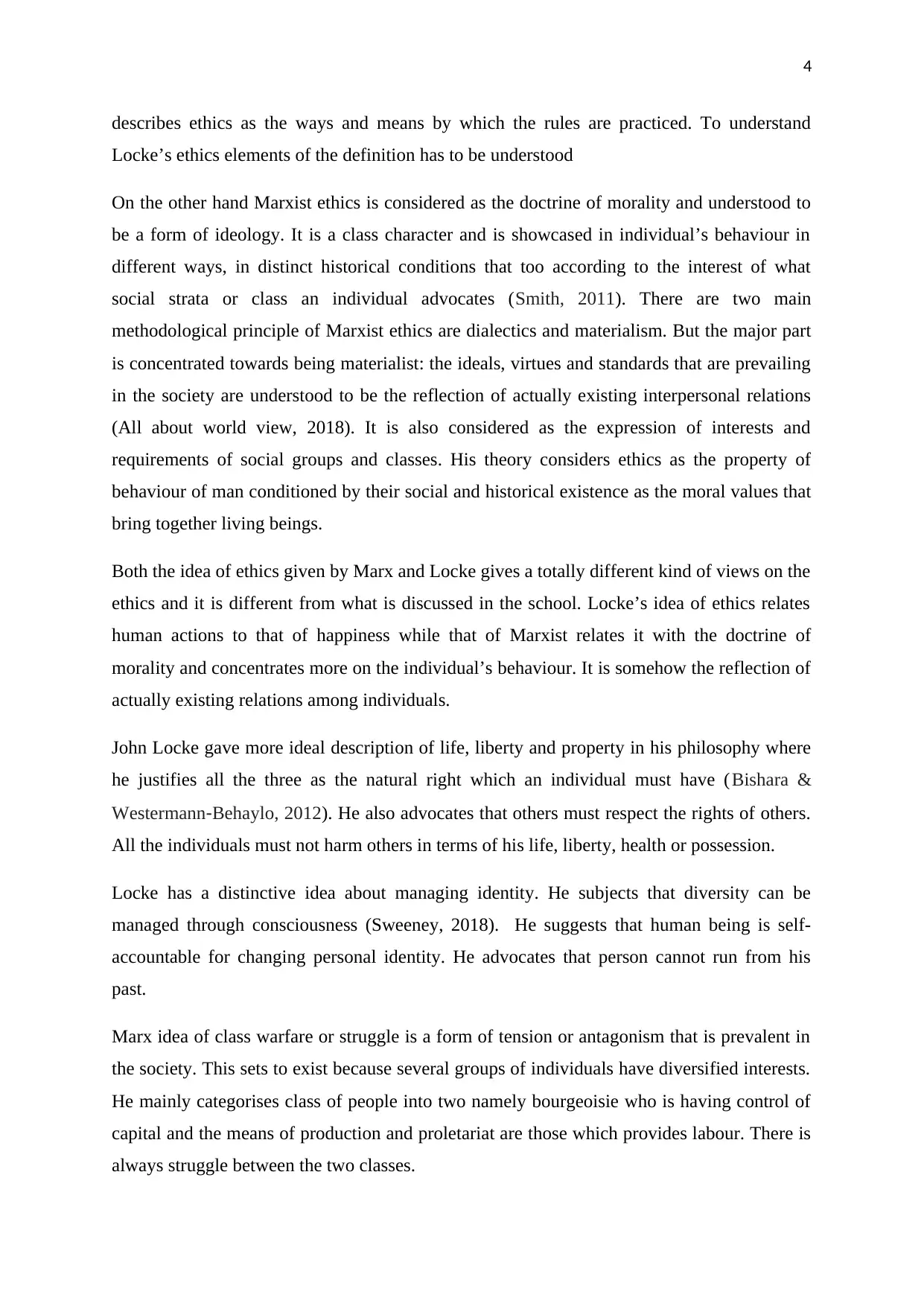
4
describes ethics as the ways and means by which the rules are practiced. To understand
Locke’s ethics elements of the definition has to be understood
On the other hand Marxist ethics is considered as the doctrine of morality and understood to
be a form of ideology. It is a class character and is showcased in individual’s behaviour in
different ways, in distinct historical conditions that too according to the interest of what
social strata or class an individual advocates (Smith, 2011). There are two main
methodological principle of Marxist ethics are dialectics and materialism. But the major part
is concentrated towards being materialist: the ideals, virtues and standards that are prevailing
in the society are understood to be the reflection of actually existing interpersonal relations
(All about world view, 2018). It is also considered as the expression of interests and
requirements of social groups and classes. His theory considers ethics as the property of
behaviour of man conditioned by their social and historical existence as the moral values that
bring together living beings.
Both the idea of ethics given by Marx and Locke gives a totally different kind of views on the
ethics and it is different from what is discussed in the school. Locke’s idea of ethics relates
human actions to that of happiness while that of Marxist relates it with the doctrine of
morality and concentrates more on the individual’s behaviour. It is somehow the reflection of
actually existing relations among individuals.
John Locke gave more ideal description of life, liberty and property in his philosophy where
he justifies all the three as the natural right which an individual must have (Bishara &
Westermann‐Behaylo, 2012). He also advocates that others must respect the rights of others.
All the individuals must not harm others in terms of his life, liberty, health or possession.
Locke has a distinctive idea about managing identity. He subjects that diversity can be
managed through consciousness (Sweeney, 2018). He suggests that human being is self-
accountable for changing personal identity. He advocates that person cannot run from his
past.
Marx idea of class warfare or struggle is a form of tension or antagonism that is prevalent in
the society. This sets to exist because several groups of individuals have diversified interests.
He mainly categorises class of people into two namely bourgeoisie who is having control of
capital and the means of production and proletariat are those which provides labour. There is
always struggle between the two classes.
describes ethics as the ways and means by which the rules are practiced. To understand
Locke’s ethics elements of the definition has to be understood
On the other hand Marxist ethics is considered as the doctrine of morality and understood to
be a form of ideology. It is a class character and is showcased in individual’s behaviour in
different ways, in distinct historical conditions that too according to the interest of what
social strata or class an individual advocates (Smith, 2011). There are two main
methodological principle of Marxist ethics are dialectics and materialism. But the major part
is concentrated towards being materialist: the ideals, virtues and standards that are prevailing
in the society are understood to be the reflection of actually existing interpersonal relations
(All about world view, 2018). It is also considered as the expression of interests and
requirements of social groups and classes. His theory considers ethics as the property of
behaviour of man conditioned by their social and historical existence as the moral values that
bring together living beings.
Both the idea of ethics given by Marx and Locke gives a totally different kind of views on the
ethics and it is different from what is discussed in the school. Locke’s idea of ethics relates
human actions to that of happiness while that of Marxist relates it with the doctrine of
morality and concentrates more on the individual’s behaviour. It is somehow the reflection of
actually existing relations among individuals.
John Locke gave more ideal description of life, liberty and property in his philosophy where
he justifies all the three as the natural right which an individual must have (Bishara &
Westermann‐Behaylo, 2012). He also advocates that others must respect the rights of others.
All the individuals must not harm others in terms of his life, liberty, health or possession.
Locke has a distinctive idea about managing identity. He subjects that diversity can be
managed through consciousness (Sweeney, 2018). He suggests that human being is self-
accountable for changing personal identity. He advocates that person cannot run from his
past.
Marx idea of class warfare or struggle is a form of tension or antagonism that is prevalent in
the society. This sets to exist because several groups of individuals have diversified interests.
He mainly categorises class of people into two namely bourgeoisie who is having control of
capital and the means of production and proletariat are those which provides labour. There is
always struggle between the two classes.
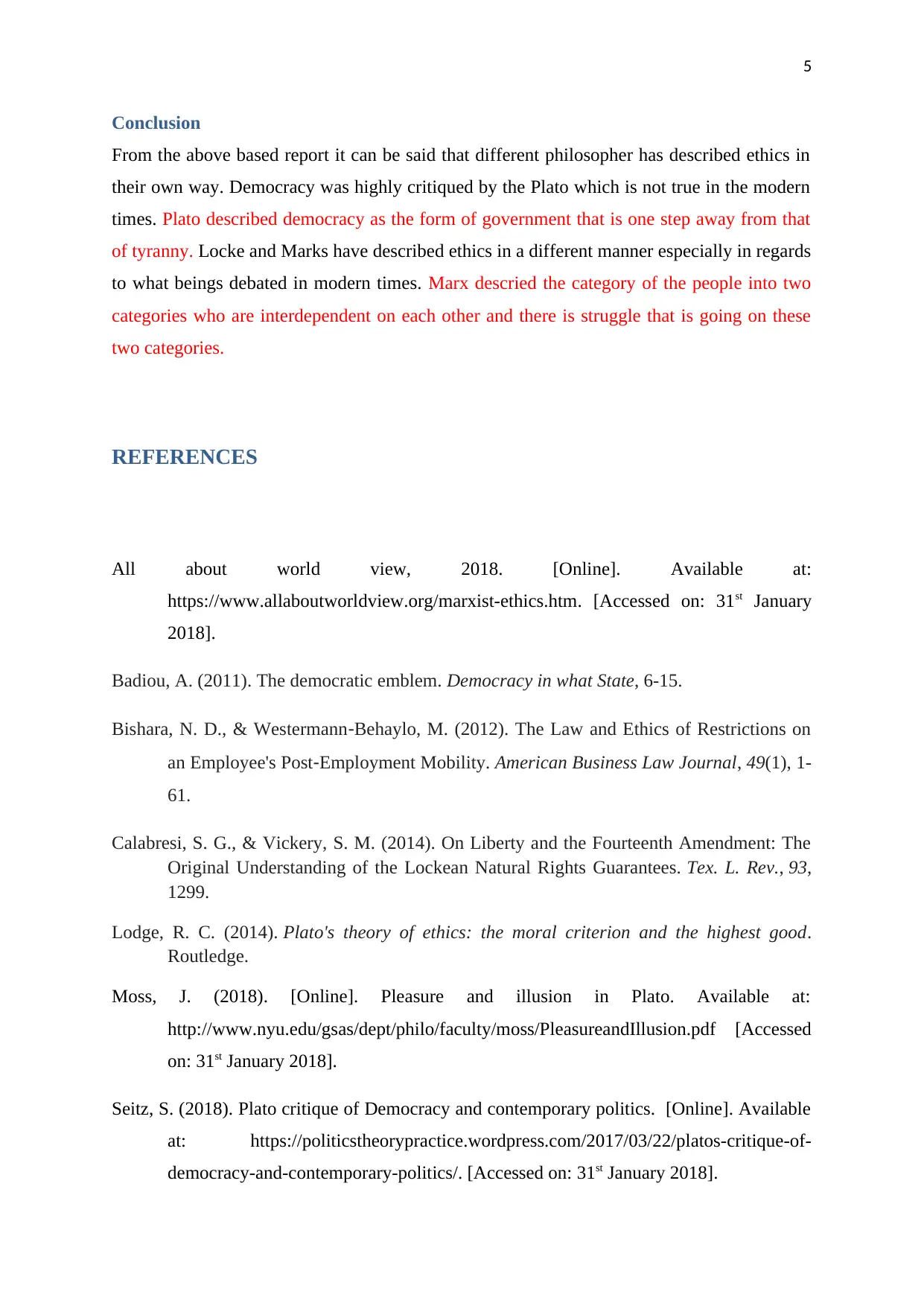
5
Conclusion
From the above based report it can be said that different philosopher has described ethics in
their own way. Democracy was highly critiqued by the Plato which is not true in the modern
times. Plato described democracy as the form of government that is one step away from that
of tyranny. Locke and Marks have described ethics in a different manner especially in regards
to what beings debated in modern times. Marx descried the category of the people into two
categories who are interdependent on each other and there is struggle that is going on these
two categories.
REFERENCES
All about world view, 2018. [Online]. Available at:
https://www.allaboutworldview.org/marxist-ethics.htm. [Accessed on: 31st January
2018].
Badiou, A. (2011). The democratic emblem. Democracy in what State, 6-15.
Bishara, N. D., & Westermann‐Behaylo, M. (2012). The Law and Ethics of Restrictions on
an Employee's Post‐Employment Mobility. American Business Law Journal, 49(1), 1-
61.
Calabresi, S. G., & Vickery, S. M. (2014). On Liberty and the Fourteenth Amendment: The
Original Understanding of the Lockean Natural Rights Guarantees. Tex. L. Rev., 93,
1299.
Lodge, R. C. (2014). Plato's theory of ethics: the moral criterion and the highest good.
Routledge.
Moss, J. (2018). [Online]. Pleasure and illusion in Plato. Available at:
http://www.nyu.edu/gsas/dept/philo/faculty/moss/PleasureandIllusion.pdf [Accessed
on: 31st January 2018].
Seitz, S. (2018). Plato critique of Democracy and contemporary politics. [Online]. Available
at: https://politicstheorypractice.wordpress.com/2017/03/22/platos-critique-of-
democracy-and-contemporary-politics/. [Accessed on: 31st January 2018].
Conclusion
From the above based report it can be said that different philosopher has described ethics in
their own way. Democracy was highly critiqued by the Plato which is not true in the modern
times. Plato described democracy as the form of government that is one step away from that
of tyranny. Locke and Marks have described ethics in a different manner especially in regards
to what beings debated in modern times. Marx descried the category of the people into two
categories who are interdependent on each other and there is struggle that is going on these
two categories.
REFERENCES
All about world view, 2018. [Online]. Available at:
https://www.allaboutworldview.org/marxist-ethics.htm. [Accessed on: 31st January
2018].
Badiou, A. (2011). The democratic emblem. Democracy in what State, 6-15.
Bishara, N. D., & Westermann‐Behaylo, M. (2012). The Law and Ethics of Restrictions on
an Employee's Post‐Employment Mobility. American Business Law Journal, 49(1), 1-
61.
Calabresi, S. G., & Vickery, S. M. (2014). On Liberty and the Fourteenth Amendment: The
Original Understanding of the Lockean Natural Rights Guarantees. Tex. L. Rev., 93,
1299.
Lodge, R. C. (2014). Plato's theory of ethics: the moral criterion and the highest good.
Routledge.
Moss, J. (2018). [Online]. Pleasure and illusion in Plato. Available at:
http://www.nyu.edu/gsas/dept/philo/faculty/moss/PleasureandIllusion.pdf [Accessed
on: 31st January 2018].
Seitz, S. (2018). Plato critique of Democracy and contemporary politics. [Online]. Available
at: https://politicstheorypractice.wordpress.com/2017/03/22/platos-critique-of-
democracy-and-contemporary-politics/. [Accessed on: 31st January 2018].
⊘ This is a preview!⊘
Do you want full access?
Subscribe today to unlock all pages.

Trusted by 1+ million students worldwide
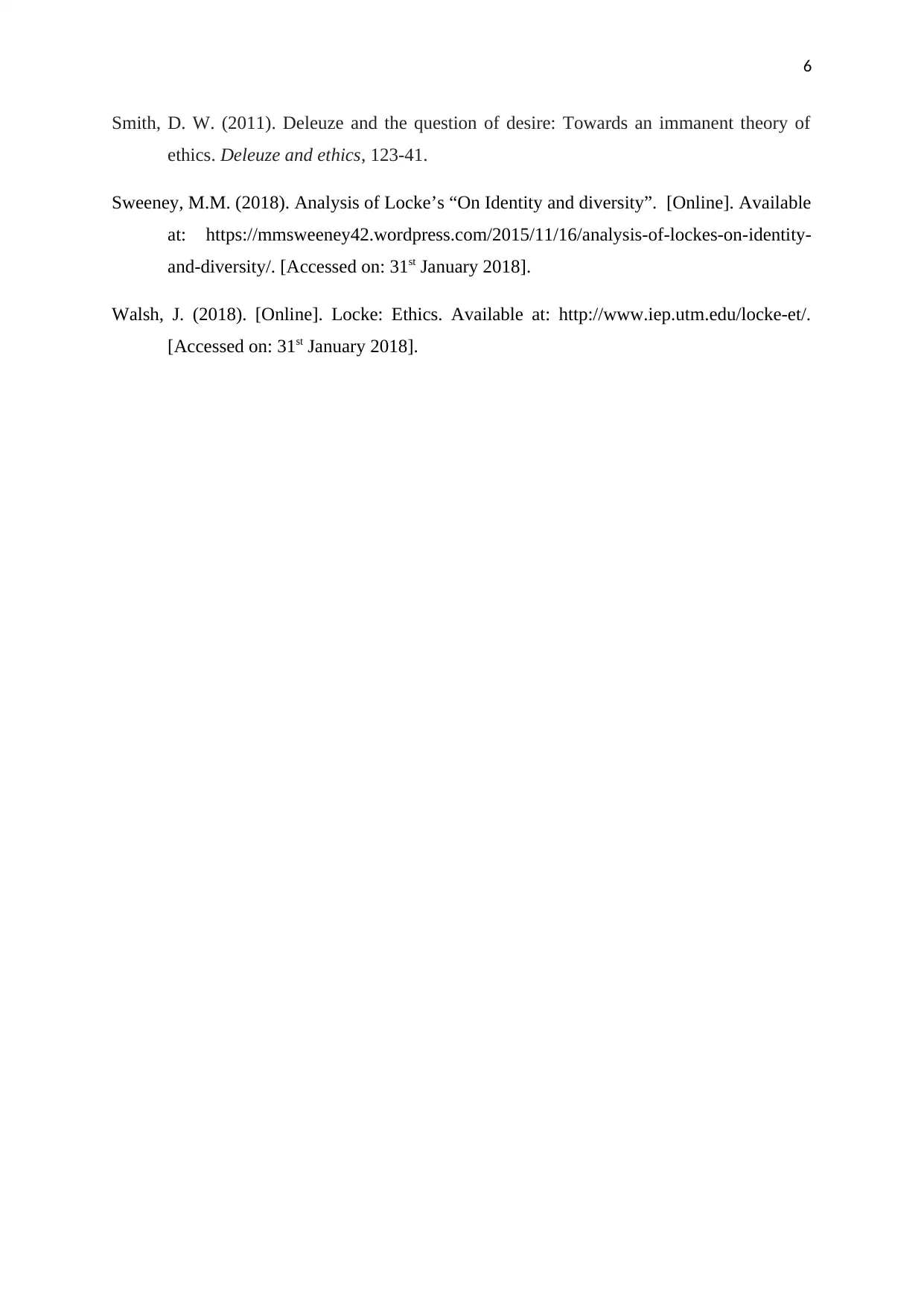
6
Smith, D. W. (2011). Deleuze and the question of desire: Towards an immanent theory of
ethics. Deleuze and ethics, 123-41.
Sweeney, M.M. (2018). Analysis of Locke’s “On Identity and diversity”. [Online]. Available
at: https://mmsweeney42.wordpress.com/2015/11/16/analysis-of-lockes-on-identity-
and-diversity/. [Accessed on: 31st January 2018].
Walsh, J. (2018). [Online]. Locke: Ethics. Available at: http://www.iep.utm.edu/locke-et/.
[Accessed on: 31st January 2018].
Smith, D. W. (2011). Deleuze and the question of desire: Towards an immanent theory of
ethics. Deleuze and ethics, 123-41.
Sweeney, M.M. (2018). Analysis of Locke’s “On Identity and diversity”. [Online]. Available
at: https://mmsweeney42.wordpress.com/2015/11/16/analysis-of-lockes-on-identity-
and-diversity/. [Accessed on: 31st January 2018].
Walsh, J. (2018). [Online]. Locke: Ethics. Available at: http://www.iep.utm.edu/locke-et/.
[Accessed on: 31st January 2018].
1 out of 7
Related Documents
Your All-in-One AI-Powered Toolkit for Academic Success.
+13062052269
info@desklib.com
Available 24*7 on WhatsApp / Email
![[object Object]](/_next/static/media/star-bottom.7253800d.svg)
Unlock your academic potential
Copyright © 2020–2026 A2Z Services. All Rights Reserved. Developed and managed by ZUCOL.





